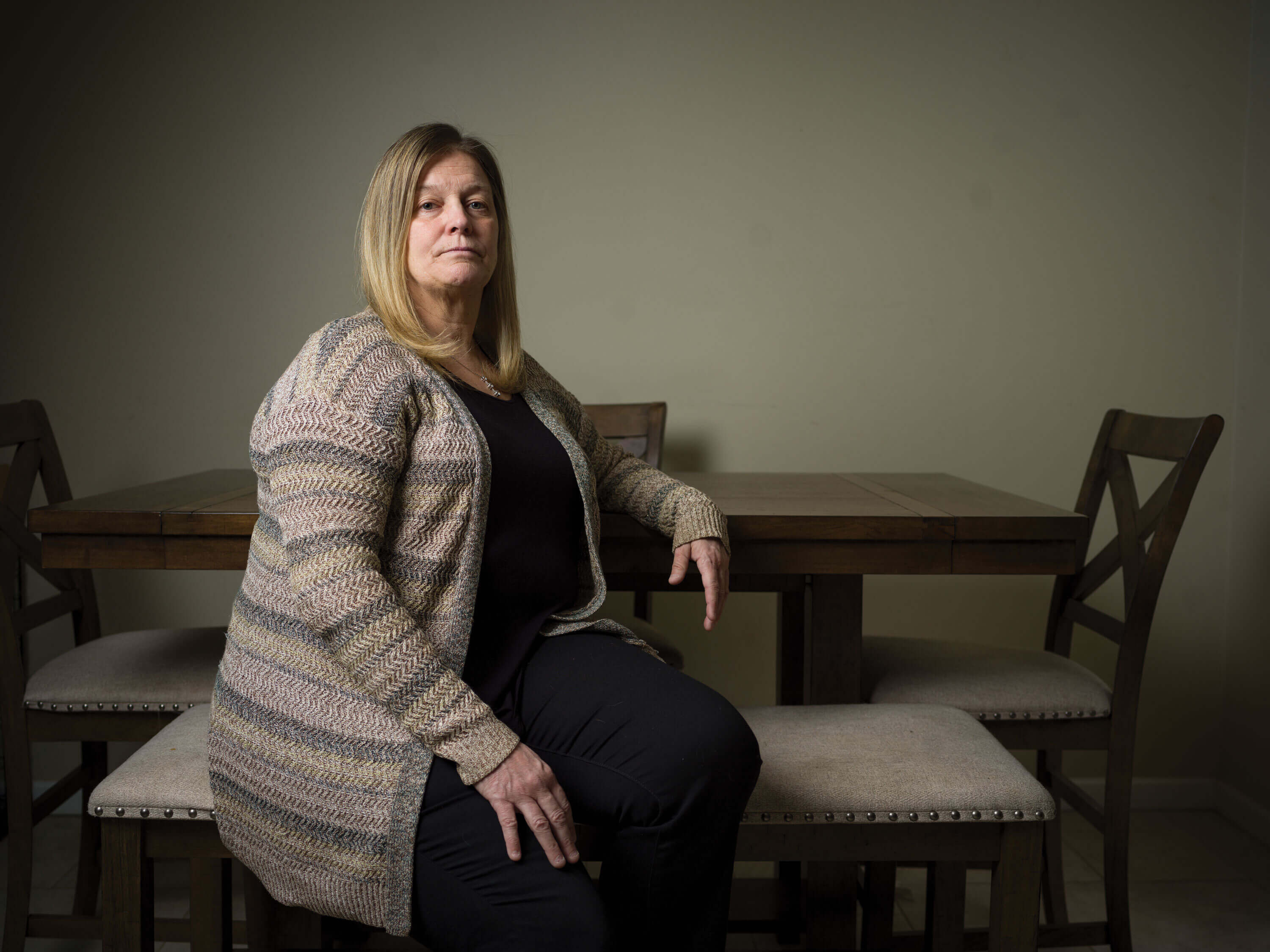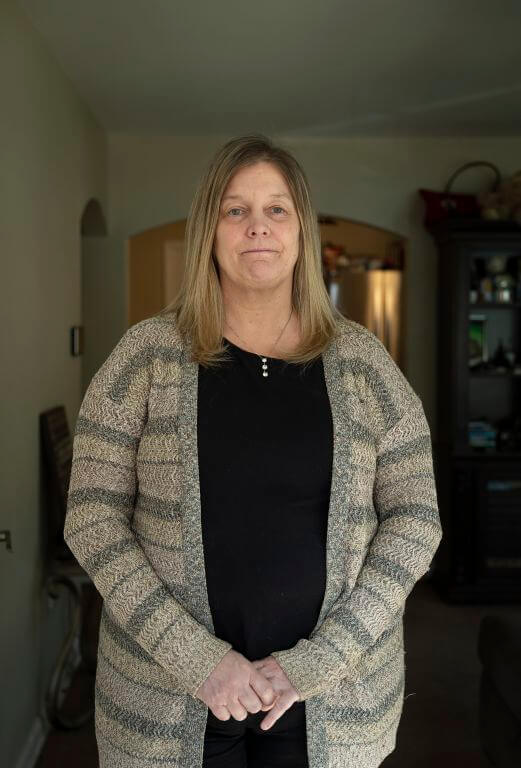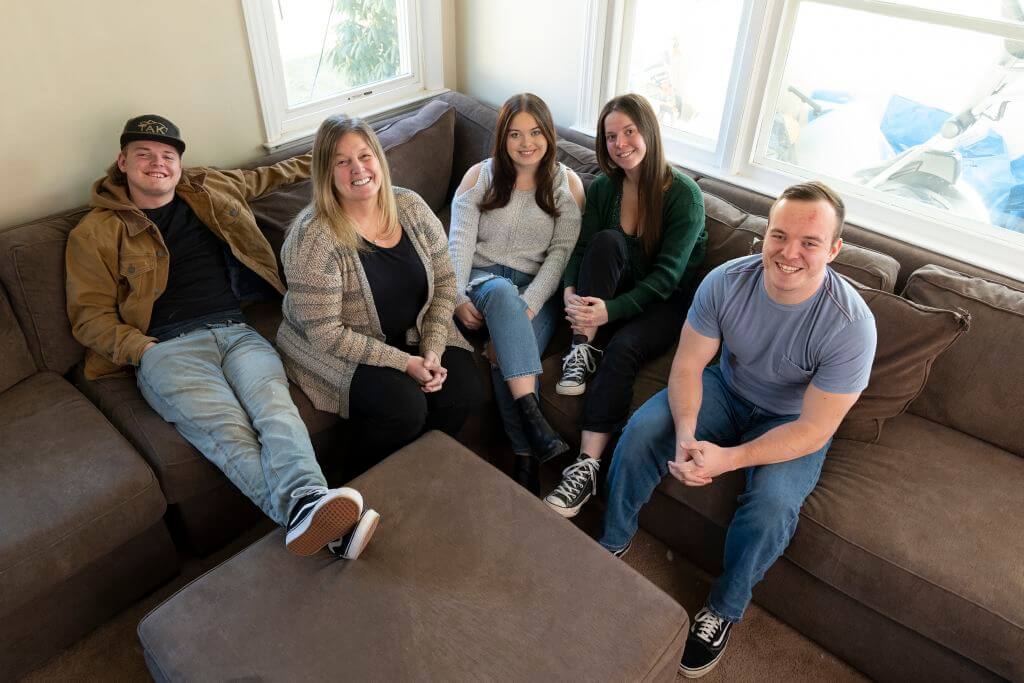
Out of the Dark
Gripped by the claws of opioid use disorder, Nikki Tierney was convicted of child endangerment. Even after 13 years of recovery, it haunted her every move: where she could work, how she could interact with her kids. So Tierney focused on changing the law—and the lives of others who are in sustained remission from substance use disorder.
Nikki Tierney ’21M remembers Sept. 21, 2007, only vaguely. She was at Monmouth Beach lying in the sand when her 3-year-old son Kole came to her. “He might have said, ‘Mom, let’s go play,’” she recalls. And with that, she was up and headed for the ocean.
But once in the water, this mother of four with the law degree and the stellar collegiate basketball career was having trouble swimming. Lifeguards told her to get out of the water. She started to, but inexplicably waded back in and tried—unsuccessfully—to swim again. Her inability to function normally could have been due to the amount of alcohol in her system. It’s also possible she had had a seizure, which she was prone to.
In the end it wouldn’t matter.
The only thing she knows for sure is that her day was spent with a bottle of vodka because she didn’t have the money to buy the pills she really wanted. She knows she was pulled out of the water by lifeguards who had called 911; she was arrested; and later she was charged with child endangerment.
Tierney also knows her son was crying that afternoon at the beach.
“It was a hard day for Kole,” she says.
Tierney’s struggles with opioid use began when she was 14, as she waited to have a surgery that would repair a hole in her stomach lining, which she had had since she was a toddler. An always-anxious child, Tierney still remembers lying on that operating table. “I was so warm,” she says. “I was so at peace.” Though she would be going under the knife, this kid—who always feared death and catastrophe—felt just fine. Her anxiety was gone. Her fears were laid aside. “But it wasn’t Jesus coming down or the bright lights,” says Tierney. “It was the morphine.”

From that day on, any time Tierney felt that anxiety creeping in, she would tell her parents her stomach hurt, and she would be off to the hospital for Maalox, phenobarbital, and a little peace. Not long afterward, Tierney found alcohol. “The drink wasn’t as powerful as the morphine,” she says, “but it was good.”
Her full-scholarship undergraduate years brought more drinking and pain pills, but they also brought straight A’s, a three-point record in basketball her freshman year, academic All-American status, and a $15,000 postgraduate scholarship from the NCAA. Outside of sports, drinking, and opiates, Tierney didn’t really have a self-image or a life plan. So after graduation, she vacantly landed on law school and took opiates with her to Rutgers School of Law in Newark. “I took pills almost every day of law school,” says Tierney. “I took pills when I took the bar.”
She finished in the top of her class. She had everything—a great job, a beautiful home, money in the bank. “So now, I have everything anyone could possibly want,” she says, “and I was so broken.”
Next there were two traumatic pregnancies (one a set of triplets and a son born a few years later) that both ended with C-sections—and pain pills. With those drugs, the insanity came back with a vengeance. “That’s when I starting kiting scripts to feed my habit,” she says.
Kiting prescriptions—filling them at one pharmacy and then immediately heading to another to fill them again or forging them entirely—is a third degree felony. And Tierney had several when she tried to end her life in 2007. All the things she had—the house, the family, the license to practice law, custody of the kids—were gone by then. She couldn’t get out from under her addiction, and her mental health had spiraled. Her child endangerment charge from that day at the beach was another felony, second degree. There was nowhere to go, she figured, but to the grave.
After she tried to take her own life, she landed at Bergen Pines, a psychiatric detox unit. Tierney’s recovery started there. So did her awakening about her mental health. When her counselor asked her what kinds of medication she was on, she confessed she didn’t even have insurance. When he asked if she was seeing a psychiatrist, she was perplexed. “Why would I?” she asked him. She went home and cried. The one person she had opened up to thought she was “crazy.” It broke her down and woke her up. “I was diagnosed with major depressive disorder and generalized anxiety disorder,” says Tierney, “and I’ve been in psychiatric care ever since.” She’s also been on what she calls her “journey of wellness” ever since.

Tierney’s life improved, one day at a time. She managed to get on her feet, develop relationships with her children, and volunteer with recovery groups and in her community. “I do parenting classes, I do group therapy, I do individual therapy, I go to church,” she says. “I do anything I possibly can not to return to the darkness.” Eventually she put 13 years of recovery together. But because of those felonies, there were things she couldn’t do. She couldn’t coach her kids’ basketball teams, couldn’t cosign their college loans, couldn’t be a class mom. Getting jobs was difficult—or required a lot of explaining. In New Jersey, there are 1,088 collateral consequences of having a felony on your record. And Tierney ran into most of them.
It wasn’t until she decided to pursue an M.S. in clinical mental health counseling at Monmouth that she read about her ability to expunge her record should she complete drug court, a program she was sentenced to and completed several years back. When Tierney went before the judge for the expungement, the judge told her, “My hands are tied. It says everybody who graduates gets expungement, but down the list, it cross-references things that can never be expunged.”
Those things? Felonies—including nonviolent, nonsexual child endangerment.
It just didn’t make sense to Tierney. People with violent felonies—murder, rape, assault—couldn’t be admitted to drug court anyway. The judge knew it was an issue, and admitted that she had just hugged and turned down another mother who was trying to get her own life back on track. She urged Tierney to call legislators or appeal her decision. “Nikki, you could do it,” she told her. “You could appeal me. You’re the one that could.”
That’s when all the roads Tierney had taken—the productive ones like law school and the difficult ones like addiction and recovery—came together to make change. What she wanted to do in that instance was cry and give up. But she made herself do something else. “I told myself: ‘Don’t you dare be so selfish, because if you could hardly make it, what about them?’” she recalls.
She was worried about the single moms who would be overwhelmingly affected by the current law.
So instead of giving up, Tierney picked up the phone. She called legislators. She reached out to Monmouth for help—professors offered advice, students and faculty signed petitions, and President Leahy gave Tierney access to Monmouth’s general counsel, John Christopher. It took nearly four years and 10,000 signatures, but she pushed and pleaded and made the case to get a bill before the legislature that would offer expungement to those facing nonviolent, nonsexual child endangerment charges should they complete drug court (today called recovery court). It passed the assembly, but when it reached the judiciary committee, it stalled. Legislators came back with an edit: They would post the bill but would require a 10-year wait before a judge could grant an expungement in those cases. The compromise was frustrating for Tierney, who knew that children would age out by the time their parents’ records were expunged. But it was a win nonetheless, one that would make a difference in her life and in the lives of other families with parents in recovery.
Today, Tierney continues to work with and for others who face substance use disorders and mental health challenges. Today, she has her Monmouth degree with a concentration in addiction studies. Today, she is a licensed associate counselor, certified alcohol and drug counselor, and peer recovery specialist at CPC Behavioral Healthcare and an in-community clinician with Jersey Innovative Science. She is also the coordinator for the Hazlet Municipal Alliance, which focuses on prevention and awareness. She knows her role in the community and in the health care profession might not have been within reach had her journey been any different, and today, she chooses to walk down this new path she has created for herself. The expungement is just one step along the way.
“It’s a huge step for myself and for others who benefit, because we will continue to pay it forward and show society that your belief in us is worth it,” Tierney told the Asbury Park Press in January, days after the bill passed. “My gratitude is going to be a verb. I want to be exhibit one of why expungements, second chances, clean slates—whatever we call it—is one of the best investments society can make.”
If you are thinking about harming yourself or attempting suicide, call the toll-free, 24-hour hotline of the National Suicide Prevention Lifeline at 1-800-273-TALK (1-800-273-8255), or by dialing 988 after July 16, 2022, to be connected to a trained counselor at a suicide crisis center nearest you.